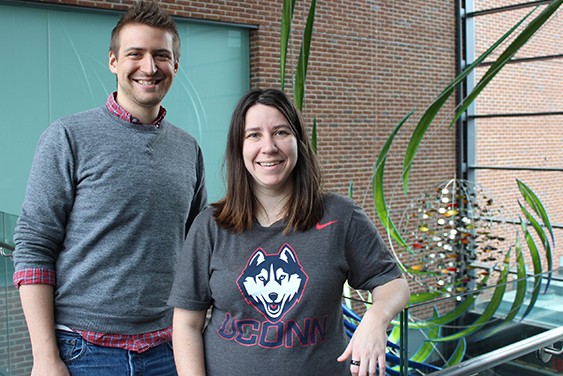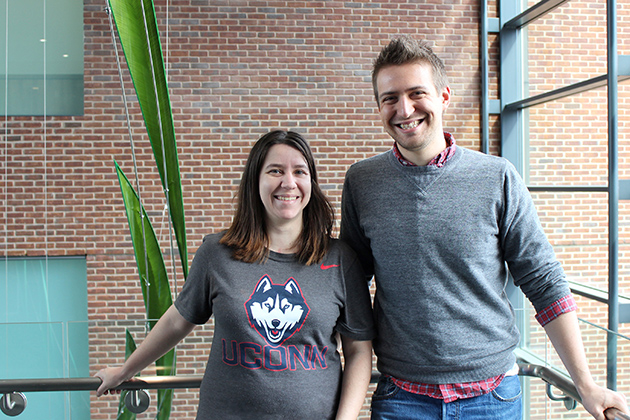
Andrew Frank and Emma Shelly, both first-year Ph.D. students in the Department of Ecology and Evolutionary Biology, and Emily Seelen, a first-year Ph.D. student in the Department of Marine Sciences, have earned Graduate Research Fellowships from the National Science Foundation (NSF).
The fellowship program supports outstanding graduate students in science, technology, engineering, and mathematics (STEM) disciplines who are pursuing research-based master’s and doctoral degrees at accredited U.S. institutions. In the 2014 competition cycle, NSF selected 2,000 award recipients from a pool of 14,000 applications.
“The fellowships will allow us to focus 100 percent on research,” says Shelly.
Fellows receive a three-year annual stipend of $32,000, along with a $12,000 allowance for tuition and fees, opportunities for international research and professional development, and the freedom to conduct their own research at any accredited U.S institution of graduate education they choose.
The oldest graduate fellowship of its kind, the program has a history of selecting individuals who go on to achieve high levels of success in their academic and professional careers, including a number of Nobel Prize-winners.
Andrew Frank’s graduate work involves studying parallel speciation, or the evolution of independently derived traits that allow for reproductive compatibility between species. Using a new approach called anchored phylogenomics, which can rapidly sequence up to 500 locations in a genome, he will analyze data from a species of North American skink to determine whether the species is an intermingling of three different lineages, each with an independent origin.
Frank, who earned a bachelor’s degree from American University in Washington, D.C., and works in the laboratory of associate professor of ecology and evolutionary biology Elizabeth Jockusch, says his work will build on research conducted by Jonathan Richmond, a former Ph.D. student in Jockusch’s lab.
“My approach looks at the molecular side of parallel speciation, and will support ideas previously explored in Professor Jockusch’s lab in a completely new way,” he says.

Emily Seelen’s research will focus on methylmercury, a compound generated from inorganic mercury that is highly toxic to fish, human consumers, and other aquatic wildlife. Her methodology will include manipulating marine sediment samples from Long Island Sound to study how different environmental factors, including climate change, impact the propagation of methylmercury in the food web.
Seelen says her results may help improve global mercury and exposure models, and “could be useful for proposing effective mercury mitigation strategies in highly contaminated regions.”
Seelen earned a bachelor’s degree from Gustavus Adolphus College in St. Peter, Minn., and currently works in the lab of marine sciences professor Robert Mason at the Avery Point campus. She says that the fellowship reflects, among other things, the guidance that she has received over the years from mentors at both institutions.
“It symbolizes the hard work I have completed to get where I am today, and reassures me that the research I will be doing is important on a broader level,” she says.
Emma Shelly, who came to UConn from Arizona State University, is working with associate professor of ecology and evolutionary biology Chris Elphick to study the mating behavior of saltmarsh sparrows. The sparrows are one of only a few songbird species in which females mate with more than two males, even though males do not help raise or care for the young.
“My research is directed at uncovering the reason behind this strategy,” says Shelly, adding that she hopes her findings regarding what motivate females’ mate number and selection will serve as a bridge between studying avian and other animal species.
“The fellowship is very competitive, and it feels great to come in fresh on the scene to make this contribution,” she says.
Three additional UConn students – two of them current undergraduates – were recognized with honorable mentions for the NSF Graduate Fellowship Program: Daniel Violette ’14 (ENG), an engineering physics major; Justin Bunnell ’14 (ENG), a mechanical engineering major; and Oliver Sawi, a Ph.D. candidate in the Department of Psychology.



